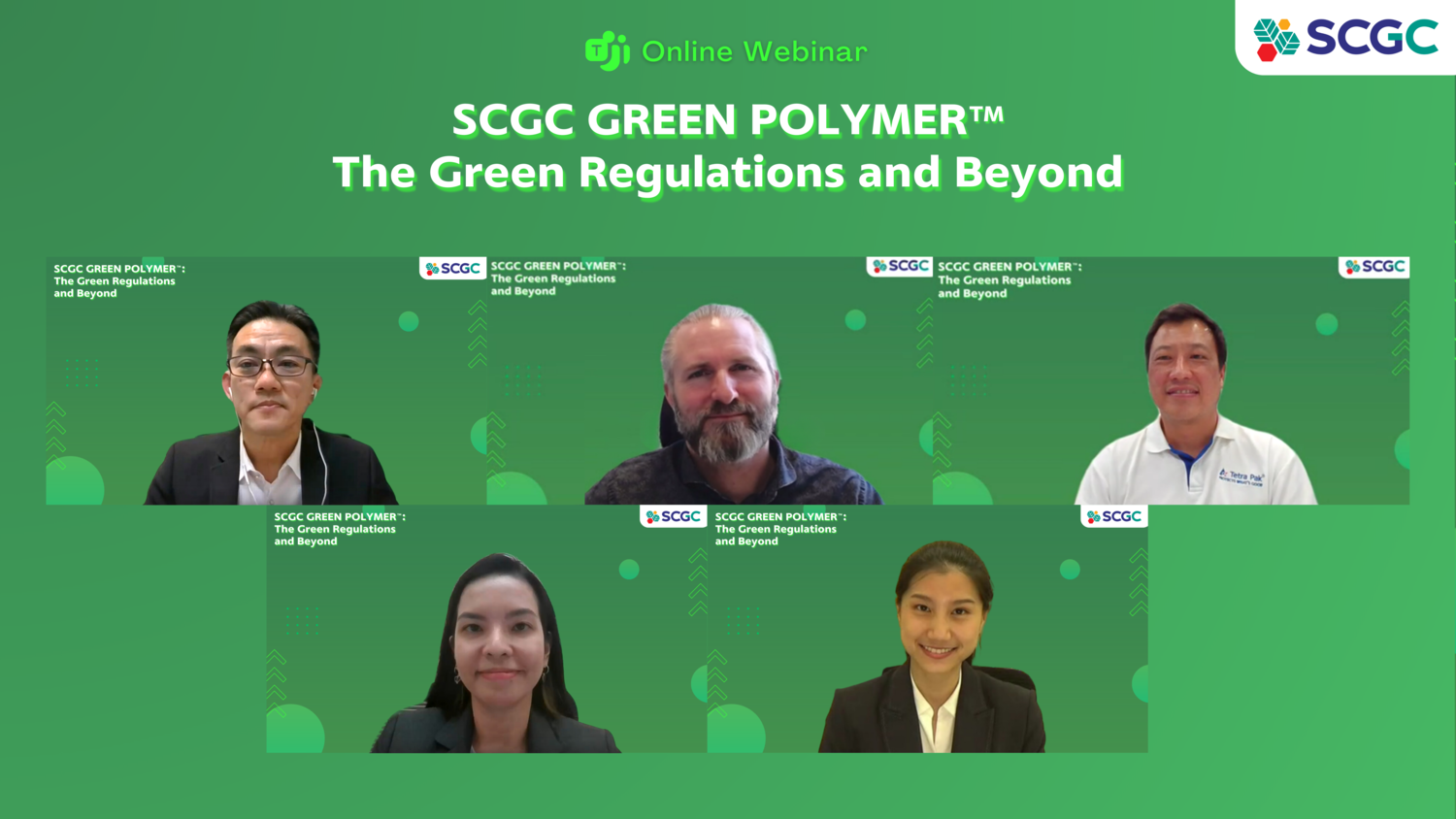SCG Chemicals (SCGC) in collaboration with Norner, a global market leader for Industrial R&D services in Polymers based in Norway, and Thailand Institute of Packaging and Recycling Management for Sustainable Environment (TIPMSE), under the Federation of Thai Industries (F.T.I), organized a webinar "SCGC GREEN POLYMERTM: The Green Regulations and Beyond" to update the environmental policies and measures of foreign countries that affect the export of Thai plastic packaging. The webinar covered two key measures, the Plastic Tax and Extended Producer Responsibility (EPR), aimed at customers, brand owners, and traders in Thailand to enhance understanding of the maximum utilization of used packaging materials in line with the principles of circular economy mechanisms.
While Thailand currently does not have stringent sustainable packaging policies like those of the European Union, Thai entrepreneurs must adjust their design and production of packaging to comply with foreign regulations if they intend to expand their market to the European Union. This includes the use of more environmentally, recycling-friendly materials and promoting the reuse of post-consumer packaging to increase competitiveness in the global market.
The webinar provided knowledge and understanding of four key issues, which are:
Introduction to the Extended Producer Responsibility and EU’s plastics tax
The Plastic Tax is a tax or fee imposed on producers, importers, or member countries that manufacture, import, or use single-use plastic products or packaging that is difficult to recycle. The criteria for assessing fees come from the amount of plastic packaging waste that cannot be recycled.
EPR is a legal obligation and a tool that helps producers take responsibility for the entire lifecycle of their products. A product life cycle spans from resource extraction, product design, manufacturing, and distribution, to disposal at the end of life of the product. In each country, there are different systems for collecting EPR fees depending on the management practices of that country. The party responsible for paying the fee is the packaging user or the brand owner. To reduce EPR fees, packaging producers must use recyclable materials that are designed for recycling, have recycled content in their products, and have materials certified for recyclability.
Impact on Thai entrepreneurs from EPR implementation
The impact on Thai entrepreneurs from the enforcement of EPR principles consists of four aspects: economic, legal, image, and environmental. Firstly, the cost of business operation will increase due to the implementation of EPR. Secondly, producers who do not comply with EPR principles will face the risk of penalties and legal action. Thirdly, consumers will have more confidence and tend to choose environmentally friendly products. Lastly, the implementation of EPR will help to reduce environmental impacts and result in the production of high-quality materials that can be reused. These impacts have led Thai entrepreneurs to make adjustments. Before the announcement of the EPR Act, producers should study the regulations closely and participate in the PackBack project to try out EPR on a voluntary basis. They should also prepare information on packaging usage and data on packaging retrieval for the organization, using technology to design and produce packaging. After the announcement of the EPR Act, producers should comply with relevant regulations and choose to manage their own waste or support PRO to manage it on their behalf. They should also collect and send data on packaging usage and packaging retrieval for the organization to promote waste reduction and recycling.
SCGC GREEN POLYMERTM: Eco-Friendly Polymer Solutions
As a leading chemical product manufacturer in Thailand and ASEAN, SCGC has developed environmentally friendly plastic innovations under the brand "SCGC GREEN POLYMERTM”, covering four solution goals: REDUCE, RECYCLABLE, RECYCLE, and RENEWABLE, aligning with the packaging for sustainability trend in which packaging is made in a greener manner.
The webinar "SCGC GREEN POLYMERTM: The Green Regulations and Beyond" not only provides knowledge about plastic tax and EPR mechanisms, but also raises awareness and promotes sustainable business growth that takes responsibility for the environment. Additionally, participants learn about the government's EPR policy to address waste management issues in Thailand. The webinar attracted over 160 interested attendees from various sectors. For more information, please contact greenpolymer@scg.com





